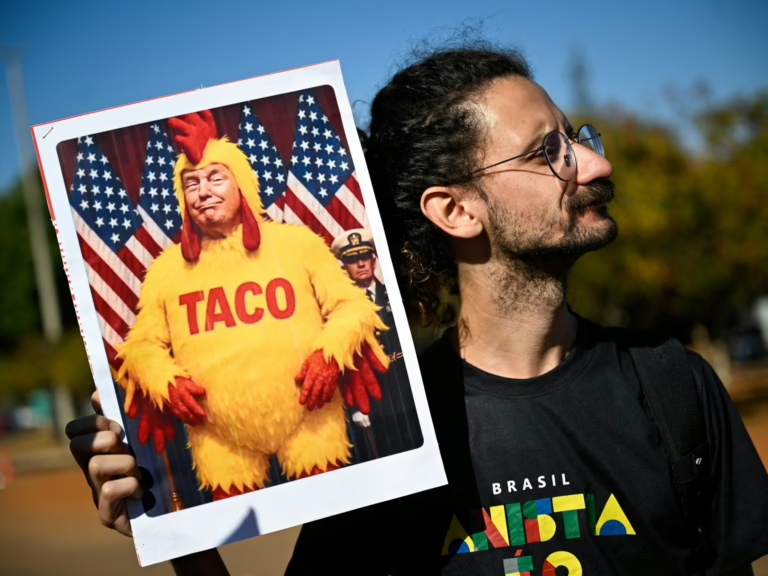In a recent phone conversation, Brazilian President Luiz Inacio Lula da Silva urged U.S. President Donald Trump to revoke the 40 percent additional tariff that the United States has imposed on Brazilian imports.
The discussion lasted approximately 30 minutes, during which the two leaders exchanged direct contact information to facilitate ongoing communication. Lula also extended a formal invitation to Trump to participate in the forthcoming climate summit scheduled to take place in Belem, as confirmed by a statement from Lula’s office.
Recommended Stories
list of 4 itemsend of list
This seemingly cordial exchange may indicate a potential easing of tensions between the two nations, which have experienced friction in recent months, according to political analysts. The call follows Trump’s remark about having “excellent chemistry” with Lula after an impromptu meeting and a brief embrace during the United Nations General Assembly (UNGA) in New York last week.
Reflecting on the unexpected hug, Lula commented, “I was about to leave when Trump approached me. He had a very warm and friendly demeanor. I believe there was genuine rapport between us.”
Following this interaction, both leaders have hinted at the possibility of arranging a formal face-to-face meeting later this month.
The discord between Trump and Lula escalated in July when the U.S. administration imposed a combined 50 percent tariff on Brazilian exports-comprising a 40 percent additional tariff plus a standard 10 percent tariff applied to all countries. Trump justified these measures by criticizing what he called a “fraudulent” legal process against former Brazilian President Jair Bolsonaro, who was recently sentenced to 27 years in prison for attempting to overturn the 2022 election results that brought Lula to power.
What Has Fueled the Growing Strain Between Trump and Lula?
Despite the United States maintaining a trade surplus with Brazil-exporting more goods to Brazil than it imports-Trump proceeded with imposing a hefty 50 percent tariff on several Brazilian products in July. Typically, Trump has defended tariffs as a tool to correct trade imbalances, but this rationale does not apply in the case of Brazil.
Bolsonaro, often dubbed the “Trump of the Tropics,” served as Brazil’s president from 2019 to 2023. Last month, he was convicted and sentenced to 27 years in prison for orchestrating an attempted military coup following his electoral defeat to Lula in 2022.
Trump, who expressed alignment with Bolsonaro’s values, has similarly claimed that his own 2020 election loss to Joe Biden was fraudulent, a claim lacking credible evidence.
In his July letter announcing the tariffs, Trump condemned Brazil’s treatment of Bolsonaro, describing it as an “international disgrace” and labeling the trial a “witch hunt” that should cease immediately.
Beyond tariffs, Trump escalated pressure by imposing visa restrictions on Brazilian Supreme Court justices and financial sanctions on Judge Alexandre de Moraes, who presided over Bolsonaro’s case.
Trump also instructed U.S. Trade Representative Jamieson Greer to investigate Brazil for alleged unfair trade practices under the Trade Act of 1974.
Nevertheless, Brazil proceeded with Bolsonaro’s prosecution, culminating in his conviction.
Although Trump expressed surprise at the verdict, calling Bolsonaro a “good man” on sentencing day, he has refrained from imposing further tariffs or sanctions since then.
In a mid-September interview with the BBC, Lula characterized Trump’s tariffs as “highly political” and warned that American consumers would face increased prices on Brazilian products as a consequence.
What Could Explain Trump’s Recent Shift Toward Lula?
The two presidents met unexpectedly on the sidelines of the UNGA in New York last Tuesday, marking their first in-person interaction. Trump remarked, “For at least 39 seconds, we had excellent chemistry.”
He further described Lula as “a very pleasant individual” and noted mutual liking, comments that some experts interpret as a sign of warming diplomatic relations.
However, Pantheon Macroeconomics’ chief Latin America economist, Andres Abadia, suggests that economic factors may be driving Trump’s softer tone. The U.S. heavily relies on Brazil for imports of coffee and meat, both sectors suffering due to the tariff dispute, leading to price surges.
Brazil is the largest coffee supplier to the U.S., accounting for $1.33 billion of the $7.85 billion total coffee imports in 2023, according to the Observatory of Economic Complexity (OEC). Since the 50 percent tariffs were enacted, Brazil’s coffee exports to the U.S. dropped by 46 percent in August and declined an additional 20 percent by mid-September, as reported by Cecafe, Brazil’s coffee exporters’ council.
This supply shortage caused U.S. coffee prices to climb 21 percent in August compared to the previous year, while overall food inflation remained around 3 percent, according to the U.S. Bureau of Labor Statistics (BLS).
“Rising coffee prices would be politically disadvantageous for Trump,” Abadia noted.
Similarly, Brazil ranks as the third-largest meat exporter to the U.S., following Australia and Canada, per the U.S. Department of Agriculture. Beef and veal prices increased nearly 14 percent in August year-over-year, which could also negatively impact Trump’s standing.
Conversely, Brazil has managed to offset some tariff impacts by diversifying its export markets, including expanding trade with China and Argentina, leading to overall export growth in September compared to the previous year.
A recent survey by The New York Times and Siena University revealed a decline in Trump’s approval ratings, with 58 percent of respondents expressing pessimism about the country’s direction.
“Inflation is biting hard in the U.S.,” Abadia said. “Any measures that can alleviate this pressure, especially ahead of the holiday season, would be welcomed.”
What Benefits Could Lula Gain?
While Brazil’s overall exports have remained resilient, restricted access to the U.S. market could harm sectors heavily reliant on exports.
Experts suggest Lula might push for expanded exemptions from tariffs for Brazilian products, beyond the current list that includes civilian aircraft and orange juice. Presently, key exports like meat and coffee face the full 50 percent tariff.
However, Lula is unlikely to agree to the unilateral concessions that countries like Japan and the European Union accepted in their trade negotiations with the U.S., such as tariff cuts and investment commitments, analysts say.
Moreover, Lula’s political standing has been strengthened by his dispute with Trump, with U.S. interference in Brazilian affairs weakening conservative opposition. Although the 79-year-old former president has not officially declared his candidacy, he currently leads polls ahead of next year’s presidential election. Lula previously served as Brazil’s president from 2003 to 2011.
Abadia identifies rare earth minerals as a promising area for collaboration. Brazil holds the world’s second-largest reserves after China, yet these resources remain largely untapped.
“Critical minerals represent a shared interest,” he explained. “The U.S. aims to reduce dependence on China and establish a significant presence in Brazil’s market.”
Trump has demonstrated a keen interest in rare earth elements, incorporating them into his agreements, such as the one with Ukraine. Brazil, for its part, aspires to become a key exporter and supplier of these minerals.
“This could foster positive cooperation,” Abadia concluded, “but Trump’s unpredictable diplomatic style continues to pose risks. Any breach of trust could further deteriorate bilateral relations.”






















